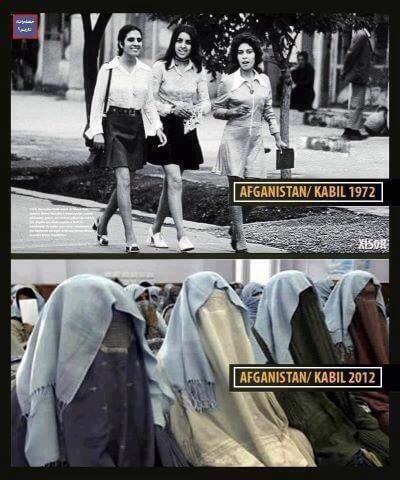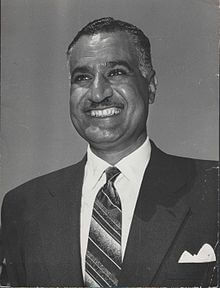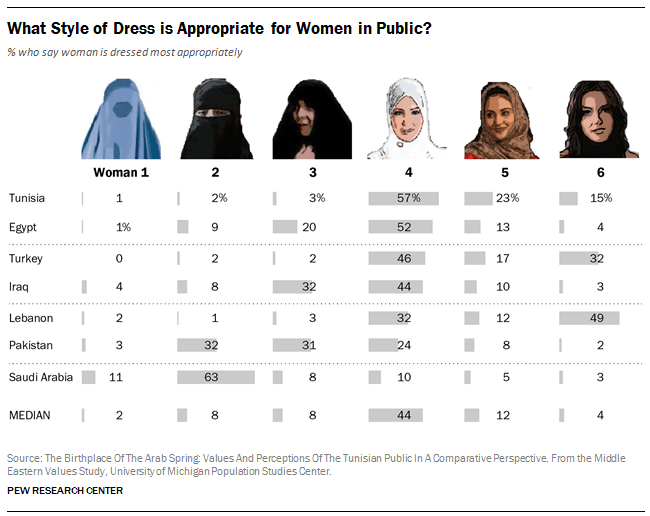This video about requiring women to wear the hijab is from a tweet by Ali A Rizvi with the comment “How times have changed.” It’s from 1958 and has been around for a while, but I think it deserves as much attention as possible.
It’s a portion of a speech from Egyptian president Gamel Abdel Nasser (left). In it he recalls when the head of the Muslim Brotherhood came to see him with the suggestion of making the hijab compulsory.
Almost sixty years ago, and all we hear is laughter at the idea. Even president Nasser himself couldn’t help but add a bit of his own mockery.
How times have changed… pic.twitter.com/TD7ZRCRXHE
— IN THE NOW (@IntheNow_tweet) June 22, 2017
Transcript
Nasser: I met the head of the Muslim Brotherhood and he sat with me and made his requests. What did he request? The first thing he asked for was to make wearing a hijab mandatory in Egypt and demand that every woman walking in the street wear a tarha [scarf].
Laughter erupts from audience.
Nasser: Every woman walking!
Audience member calls out:Let him wear it!
Nasser and audience laugh. Spontaneous applause breaks out.
Nasser: And I told him, if I make that a law, they will say that we have returned to the days of Al-Hakim bi-Amr Allah [see below] who forbade people from walking during the day and only allowed walking at night …
Laughter from audience.
Nasser: … and my opinion is that every person in his own house decides for himself the rules. And he replied, “No, as the leader you are responsible.” I told him, “Sir, you have a daughter in the School of Medicine and she is not wearing a tarha. Why don’t you make her wear a tarha?” If you …
Laughter and applause from audience.
Nasser: If you are unable to make one wear …
Applause and chanting from audience.
Nasser: If you are unable to make one girl, who is your daughter, wear a tarha, you want me to put a tarha on ten million women myself?
Nasser and audience laugh uproariously. Applause.
Al-Hakim bi-Amr Allah
The leader Nasser refers to in the speech is notorious in Islamic history. Al-Hakim bi-Amr Allah was the sixth Fatimid caliph and 16th Ismaili imam. He was caliph from 14 October 996 to 13 February 1021.
There are two views of Al-Hakim bi-Amr Allah, depending on whether you are a fan of his teachings or whether you oppose them. These days it would be like asking your view of Abu Bakr al-Baghdadi, the leader of DAESH.
From Wikipedia:
Histories of al-Hakim can prove controversial, as diverse views of his life and legacy exist. Historian Paul Walker writes: “Ultimately, both views of him, the mad and despotic tyrant irrationally given to killing those around him on a whim, and the ideal supreme ruler, divinely ordained and chosen, whose every action was just and righteous, were to persist, the one among his enemies and those who rebelled against him, and the other in the hearts of true believers, who, while perhaps perplexed by events, nonetheless remained avidly loyal to him to the end.
Al-Hakim bi-Amr Allah was Shi’a, therefore it’s probably safe to assume that in majority Sunni Egypt, the negative view of him is the one that prevails.
Conservative Religion and Sexuality
Virtually the only people who have an obsession with covering up women are the conservative religious.
I have a theory about conservative religion and sexuality. It doesn’t just apply to Islam, but all religions that use sex and sexuality to control their followers.
Sex is, of course, a basic instinct of the human animal. The goal of all living things is to reproduce, and most animals require sex to do that. Religion has found that sex is a good way to control people. They invent reasons for people to feel guilty about perfectly normal biological processes.
Almost all people are going to have sexual thoughts of one kind or another that religion deems to be sinful. Just feeling sexual desire for someone other than a spouse of the opposite sex is a problem in most religions.
Religion requires people to feel guilt for those thoughts, then seek the help of that religion in suppressing or otherwise dealing with them. Ultimately the thoughts always come back and so religion retains control. Creating feelings of guilt for natural responses is cruel and destructive.
Religion screws up people’s brains.
Islam and Women’s Clothing
This is a topic I’ve written on at length before. One post bears the same name as this section of this post: ‘Islam and Women’s Clothing‘. Another was written on the occasion of ‘World Hijab Day: 1 February 2015‘.
Basically, I find it offensive that so many women live with the idea that to be a good Muslim, they have to dress in a particular way. There are three verses in the Qur’an that supposedly require women to cover themselves. To me, it’s all in the interpretation. This is one of the verses (from the Yusuf Ali or Muhammad Asad translations):
O Prophet! Tell your wives and daughters and the believing women that they should draw over themselves their jilbab (outer garments) (when in public); this will be more conducive to their being recognized (as decent women) and not harassed. But God is indeed oft-forgiving, most merciful. (33:59)
To me it’s quite obvious here that Muhammad himself didn’t require his wives and daughters to cover themselves, but that some other man thought he should. Perhaps Muhammad’s wives and/or daughters were the victims of harassment and someone came along and said it was their own fault because of their dress. And perhaps Muhammad thought like I do – that a woman’s clothing is no excuse to harass her! And if God “… is indeed oft-forgiving, most merciful,” then it seems he doesn’t require it either. However, this is a verse that is used to show that a women should wear a burqa.
The other verses are no clearer than the one above in my opinion. (You can see all three verses in the ‘Islam and Women’s Clothing‘ post.
Women’s Clothing in Islam by Country
What religious leaders in Muslim-majority countries think is suitable garb for women varies by country. This alone should be evidence that that the verses are open to interpretation. A survey by Pew Research Center in 2013 came up with the following result for a selection of countries:
In this survey, only 2% of women overall thought that Woman 1 was dressed most appropriately. However, if the survey had included Afghanistan, especially those parts under the control of the Taliban, a majority from that country would chose that model.
Muslim Women in the West and the Hijab
In the West, it depends what country the majority of Muslims or their ancestors originally came from that determines what is appropriate dress. The Muslim Council of Britain, for example, has said that a woman must wear the hijab to be a good Muslim woman.
The United States Muslim Women’s League are working to take the focus away from the hijab, though when you see websites like HuffPo, it seems they are fighting a losing battle. The US Muslim Women’s League wrote this in 1997:
Among Muslims, the division and intolerance expressed regarding women’s dress is one factor that impedes our growth and development as a meaningful presence in the world today. All Muslims struggle with matters of faith, identity, and community. With the pressing issues facing the Ummah [diaspora] today such as poverty, illiteracy, violence, warfare and other ills, we must ask ourselves if we want to be consumed and paralyzed by the issue of women’s dress. Placing the burden primarily on women without calling for the accountability of men to control themselves and their sexual appetites is in violation of the spirit of the Qur’an which is about self-control and self-restraint.
There are several articles about women’s clothing on their website that are worth perusing.
Wahhabism
 At the time President Nasser spoke in the clip above, Egypt was a pre-eminent power in the Muslim world. Countries in the Middle East were making money from oil, but the West still had firm control. Then OPEC made use of their power, and the oil-producing countries became hugely wealthy. The biggest was, of course Saudi Arabia.
At the time President Nasser spoke in the clip above, Egypt was a pre-eminent power in the Muslim world. Countries in the Middle East were making money from oil, but the West still had firm control. Then OPEC made use of their power, and the oil-producing countries became hugely wealthy. The biggest was, of course Saudi Arabia.
The problem with Saudi Arabia is that the Saud family had made a deal with the devil – the Wahhabis.
The Wahhabis get their name from an eighteenth-century preacher and scholar, Muhammad ibn Abd al-Wahhab (1703–1792). They were initially a revivalist movement with a commitment to going back to a purer form of Islam. They rejected some of the things that had become part of Islam, like the visiting of shrines and tombs, which they consider idolatry.
In 1744 the Wahhabis made an agreement with the local emir, Muhammad ibn Saud of the House of Saud, promising obedience in return for protection. The Wahhabis paid for that protection via a tithe, and the House of Saud got political legitimacy. Then in 1902 a 20-year-old descendant of Muhammad ibn Saud, Abd al-Aziz ibn Saud, took Riyadh after a small battle.
The Influence of Saudi Arabia

Abd al-Aziz ibn Saud, First King of Saudi Arabia 1932-1953 (Source: Wikipedia Commons. Click pic to go to source.)
Abd al-Aziz ibn Saud wanted control of the whole Arabian peninsula so he sought help from the Ikhwan (Muslim brothers). The Ikhwan are also ardent Wahhabis. Their own goal was to spread Wahhabism throughout the world and saw the Saud family as a way to do that.
Following the massive increase in the value of their oil in the 1970s, the House of Saud became international players.
Conservative Islam exploded in the 1970s. When in 1979 the shah of Iran was deposed and the grand mosque was taken over by extremists in Saudi Arabia, the king of Saudi Arabia became worried about his own future. He made an agreement with his own Wahhabi clerics, handing over most power and money to them. With government power and money behind them, the Wahhabis were in a position to export their brand of religion across the region, which they did. Soon, Saudi-sponsored madrassas were popping up everywhere, especially Pakistan and Afghanistan.
We’ve been seeing the result of that ever since with a trend towards conservatism across the Muslim world. As always with religion, there are a small number who are willing to kill and die for their beliefs. As we all know, in Islam they’re known as jihadis. And, because the sponsorship of Wahhabi madrassas has meant a big increase in the number of Muslims with extreme conservative beliefs, so the number of jihadis is much greater.
The House of Saud is Finally Taking Responsibility
Without actually admitting they are the problem, the government of Saudi Arabia is starting to make some moves to change things. They have, for example, joined the sanctions that make it difficult for extremist groups to get money. Until recently, private Saudi citizens were some of the biggest donors of groups like DAESH and Al-Qaeda. That is part of what’s going on with Qatar at the moment – Qatar is still allowing those groups to use financial institutions in their country.
The Future
In my lifetime, things have become much better for women in the West, and indeed in most of the world. However, the pernicious influence of conservative Islam has made things worse for women in the areas where it holds sway.
Only sixty years ago an Egyptian president was laughing at the idea of forcing women to cover up. Now the spread of conservative Islam means that’s no laughing matter. In the 1960s the Muslim Brotherhood unsuccessfully tried to overthrow president Nasser. Nasser is now long gone but the Muslim Brotherhood is still around and just a few years ago they were even the official government of Egypt for a short time.
There seems to be a groundswell of public opinion against conservative Islam in the Middle East. At the same time, the jihadists, in their death throes, are killing those they don’t consider Muslim enough in their tens of thousands. Islamist terrorism is an everyday occurrence in the Muslim world. The jihadists are, as is typical with the conservative religious, trying to force their beliefs on others via violence and threats of violence. Ultimately though, this never works. To quote Princess Leia from Star Wars:
The more you tighten your grip, Tarkin, the more star systems will slip through your fingers.
Around the world women will continue to move towards greater equality though that will take longer in some countries than others. But it’s inevitable because it’s better for society. Countries that are more peaceful, more equal, more open, have better human rights records, and are more tolerant are more successful.

And that picture prompts me to illustrate the truism – Not all prisoners are behind bars:

Societies, like people continue to evolve. Equality will happen. For the sake of women, I just hope it doesn’t take too long.
If you enjoyed reading this, please consider donating a dollar or two to help keep the site going. Thank you.




One would hope that with modern communications, the internet, etc. the time required to liberalize the East would be compressed. Where western influence is allowed to have an effect it will bend societies like Afghanistan free from their restrictive past – as it already has until the recent conservative swing. Yet, you can see that it’s likely to be a rocky road. I won’t hold my breath.
I think the Internet will help a lot too. I think it’s the main reason behind the spread in atheism/rationalism in recent years too. People have access to ideas they didn’t come across before, and are able to explore those ideas.
This is a very comprehensive and deeply thought out post. I find your reasoning re the way religion controls sexual behavior quite compelling and thought provoking, and the clip from Nasser’s speech is priceless; absolutely amazing. Wish I could FW it to my British pal who lives Cairo, but I’m afraid the censors might give him trouble – he doesn’t feel comfortable discussing anything political relating to Egypt online.
Also, quite interesting to see that photo of the Afghani women wearing burkas. Apparently, now it isn’t even modest enough to wear a burka — now they’ve got to put towel/veils on their heads on top of their burkas! Wallah!
Thanks. I appreciate the support, especially from you. 🙂
It’s very good to have that particular photo of the young Afghani women in 1972. Most people have absolutely no idea how cosmopolitan Afghanistan was in those days, with many university educated professional women who were involved in many aspects of public society. Searching for more photos and info II found these interesting links re women in Afghanistan before things went so tragically wrong:
– http://www.dailymail.co.uk/news/article-2543902/Photos-just-free-women-Afghanistan-Taliban-rule.html; http://dangerousminds.net/comments/it_didnt_always_suck_to_be_a_woman_in_afghanistan; and http://www.pbs.org/wnet/women-war-and-peace/uncategorized/timeline-of-womens-rights-in-afghanistan/
I must apologize to you for my immoderate outburst in a comment to your post on FGM a few weeks ago. I was outraged beyond my ability to contribute substantively to the discussion, and acted in the heat of the moment – I vented my rage on the virtual page and reflexively pressed ‘reply’ before a cooling-off period, which should be compulsory with me. I really wouldn’t want that abominable fool to be castrated, and though I’m not really regretful for cracking cruelly wise, I apologize for expressing myself that way on your site.
The article about Afghanistan pre-Taliban is very interesting. I wish more people were aware of it. Too often people say things like, “they want it that way” or something equally ignorant. They also don’t seem to understand that it’s not always easy to stand up to thugs, especially when mere survival is the imperative.
Apology accepted. I can understand anybody cracking, especially when they know people well who have gone through the cruelty of FGM. I appreciate the apology, and I know the outburst is not like you.
I always heard Gamel Abdel Nasser described as an extremist (probably because of his pan-arabism and opposing the existence of Israel). Nowadays he would sound -if that track is something to go by- like a moderate, a liberal even, it seems. I’d take Nasser over most extant leaders of Islamic countries any day.
I think it was probably the pan-Arabism thing too. The British were used to being in charge in Egypt (and most of the Middle East) and he didn’t buckle to their demands.
Yes, I did mention that pan-arabism. I think that Egypt and Syria even formed a Union at some stage.
from Wikipedia:
‘Nasser remains an iconic figure in the Arab world, particularly for his strides towards social justice and Arab unity, modernization policies, and anti-imperialist efforts. His presidency also encouraged and coincided with an Egyptian cultural boom, and launched large industrial projects, including the Aswan Dam and Helwan City. Nasser’s detractors criticize his authoritarianism, his human rights violations and his dominance of military over civil institutions, establishing a pattern of military and dictatorial rule in Egypt.’ […]
‘He was known to be personally incorruptible, a characteristic which further enhanced his reputation among the citizens of Egypt and the Arab world. Nasser’s personal hobbies included playing chess, American films, reading Arabic, English, and French magazines, and listening to classical music.
Nasser had few personal vices other than chain smoking.’
The latter probably contributed to his early (at 52) death from a heart attack in 1970. Whatever your take on him: an interesting figure.
As said, I’d take him anytime over virtually all extant Arabic leaders (or possibly even the extant American one, for that matter).